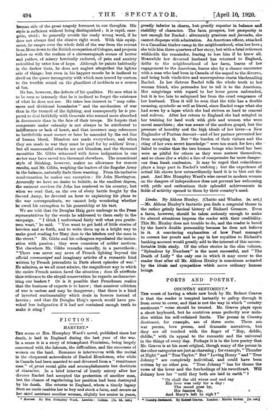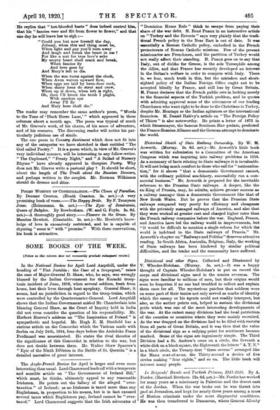POETS AND POETRY.
COUNTRY SENTIMENT.* Tem worst of having a. whole new book by Mr. Robert Graves is that the reader is tempted instantly to gallop through it from cover to cover, and that is not the way in which " country sentiment " verse should be treated. Mr. Graves plays upon a short keyboard, but he contrives some perfectly new melo- dies within his self-ordained limits. The poems in Country Sentiment, for example, are of three sorts. There are war poems, love poems, and dramatic narratives, but they are all touched with the finger of " Hey, diddle, diddle," with its appeal to the romantic and the universal in the things of every day. Perhaps it is in the love poetry that Mr. Graves is at his most original, though many of the poems in the other categories are just as charming ; for example, " Thunder at Night " and " Tom Taylor." But " Loving Henry " and " True Johnny " are completely individual, and could have been written by no other pen. " True Johnny " has for theme the vows of the lover and the forebodings of his sweetheart. Will Johnny love her " until they both are laid in earth " ?
" Or shall the old wives nod and say His love was only for a day : The mood goes by, His fancies fly, And Mary's left to sigh ? "
• County Sastinent. By Babeat Graves. Landon : Martin Seeker. [5s. net4 He replies that " hot-blooded haste " does indeed control him, that his " fancies veer and flit from flower to flower," and that
one day he will leave her to sigh:— "Could you but now foretell the day, Johnny, when this sad thing must be, When Light and gay you'll turn away And laugh and break the heart in me t For like a nut for true love's sake My empty heart shall crack and break,
When fancies fly And love goes by And Mary's left to die.
When the sun turns against the clock, When Avon waters upward flow, When eggs are laid by barn-door cock, When dusty hens do strut and crow, When up is down, when left is right, Oh, then I'll break the troth I plight, With careless eye
Away ru fly
And Mary here shall die."
The reader may remember the same author's poem, " Words to the Time of Black Horse Lane,' " which appeared in these columns about a month ago. The poem was typical of much of Mr. Graves's work, of his charm, of his sense of adventure, and of his resource. The discerning reader will notice his par- ticularly judicious use of simile.
The one poem in Country Sentiment which does not fit into any of the categories we have sketched is that entitled " The God called Poetry." It is a poem which, in view of Mr. Graves's very individual manner, will be interesting to any fellow-writer. " The Cupboard," " Frosty Night," and " A Ballad of Nursery Rhyme " have already appeared in Georgian Poetry. Why does not Mr. Graves write a pastoral play ? It should be short, about the length of The Truth about the Russian Damen, and perhaps written in the couplet. Mr. Norman Wilkinson should do dresses and decor.



































 Previous page
Previous page